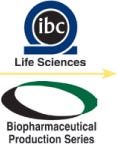Antibody Development and Production Conference
December 1, 2008

IBC’s Antibody Development and Production conference will help you evaluate the latest scientific and technical approaches to successfully accelerate the development of robust processes. This event is regarded by the industry as the most comprehensive event that brings you best practices across the spectrum, including the most critical stages of upstream and downstream processing.
Keynote Presentations
“How Do We Get to 30 g/L Using Fed-Batch Technology? What Are the Limitations?” by Thomas Ryll, director of cell culture development at Biogen Idec: Production of antibody drugs using mammalian cell culture has made significant progress over the past 20 years. Typical titers are nowadays in the 2–5 g/L range, with reports more recently in the 10 g/L range. The presentation will discuss some limitations involved with standard fed-batch process realization in typical manufacturing facilities. Case studies of intensifying such processes at Biogen Idec show how limitations to titer and volumetric productivity are estimated. Potential improvement opportunities will be discussed.
“Next Generation Commercial Processes” by Timothy S. Charlebois, director of cell and molecular sciences at Wyeth BioPharma: Dramatic advances in cell culture technology over recent years have altered the landscape, prospects, and drivers for the future of biomanufacturing. Even as these improvements are consolidated and harvested into contemporary clinical and commercial processes, a variety of challenges and opportunities remain that will require aggressive innovation and adaptability across many disciplines.
COLOCATED EVENTS
This meeting is part of IBC’s Biopharmaceutical Development and Production Week (2–6 March 2009), which includes the following events:
IBC’s 13th International Process Validation for Biopharmaceuticals (2–3 March 2009)
IBC’s 5th International Outsourcing Manufacturing of Biopharmaceuticals (2–3 March 2009)
IBC’s 4th Annual Technology Transfer for Biopharmaceuticals (2–3 March 2009)
IBC’s Inaugural Nonantibody Protein Therapeutics Development and Production (4–5 March 2009)
Also, Rick Rutter (vice president of pharmaceutical sciences in biologics at Pfizer Inc.) will speak on “Challenges of Creating a New Biologics Unit.”
New for 2009
We have expanded our program to include strategy discussion forums, interactive workshops, and panel discussions to provide invaluable and uncensored insight on critical topics, including the following: cell line stability and heterogeneity, chemically defined and nondefined additives, hydrolysates and lot-to-lot variability, protein A capture (perception and reality), alternative purification methods (“promise or overpromise”), the future of continuous downstream processing, and downstream processing’s ability to keep pace economically with cell culture.
Comprehensive coverage of the major drivers in bioprocessing will including the following: accelerated cell line development and controlling clonal variability, strategic approaches for shortening development timelines, technical advances in upstream and downstream processing, influence of the product on manufacturability, upstream process optimization for productivity and product quality, effective strategies to overcome manufacturing challenges, approaches to improve and control process and product quality, how to increase productivity of downstream processing, and alternatives to chromatography and protein A.
Scientific Advisory Board
Alahari Arunakumari (Medarex Inc.), John Birch (Lonza Biologics plc), Timothy S. Charlebois (Wyeth BioPharma), Laurie Donahue-Hjelle (Invitrogen Corporation), Uwe Gottschalk (Sartorius Stedim Biotech), Brian R. Hubbard (Amgen Inc.), Duncan Low (Amgen, Inc.), Anthony Mire-Sluis (Amgen Inc.), Wolfgang Noe (Biogen Idec), Nels Pederson (Biogen Idec), Patricia Rancatore (Genentech, Inc.), David K. Robinson (Merck Research Laboratories), Rick Rutter (Pfizer Inc.), Thomas Seewoester (Amgen Inc.), Torsten W. Schulz (Boehringer Ingelheim Pharma GmbH & Co. KG), Abhinav Shukla (Bristol-Myers Squibb), Ron Taticek (Genentech, Inc.), and Gary J. Welch (Abbott Bioresearch Center)
You May Also Like





